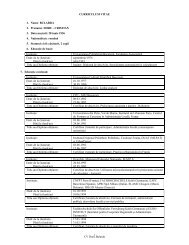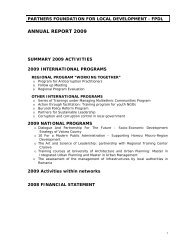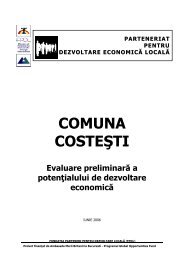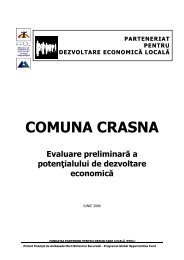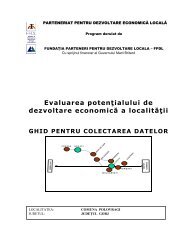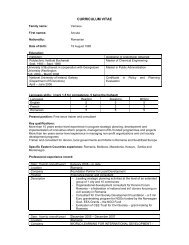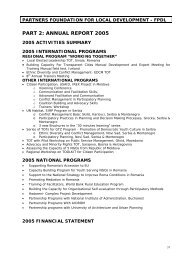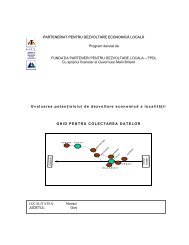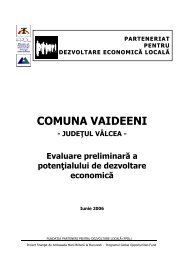Organizational Development: A Manual for Managers and ... - FPDL
Organizational Development: A Manual for Managers and ... - FPDL
Organizational Development: A Manual for Managers and ... - FPDL
Create successful ePaper yourself
Turn your PDF publications into a flip-book with our unique Google optimized e-Paper software.
9. Tools<br />
9.1 WARMING UP AND TUNING IN. One of specific features of the “transitional” audience is a<br />
very different background of officials who come <strong>for</strong> the course. There may be highly educated<br />
professor in one group with the worker or driver. Some are experienced national-wide known<br />
politicians <strong>and</strong> others are not interested in politics at all. Political belongings may cause quite<br />
hostile pre-adjustments. Ages are different also. However, they all are men <strong>and</strong> women, usually<br />
they are good people, they are all interested in what will happen, who are the neighbours <strong>and</strong><br />
trainers, <strong>and</strong> so on. There<strong>for</strong>e, good way to start is to tell trainees more about the organisers,<br />
why do they do it, who are trainers <strong>and</strong> what are their ambitions. For example, we always say<br />
that we consider ourselves far not so smart <strong>and</strong> experienced like our trainees, but we have<br />
some special skills in helping other people to exchange their knowledge <strong>and</strong> experience,<br />
probably to make theirs life experience a bit more conscious <strong>and</strong> operable, <strong>and</strong> so on. However,<br />
it is necessary to advice audience in indirect <strong>for</strong>m about the relevant background <strong>and</strong><br />
achievements of those who are going to teach them, just to diminish a cognitive dissonance of<br />
some participants, who could consider themselves older, better educated <strong>and</strong> experienced, than<br />
trainers.<br />
There are many ways to become acquainted with trainees. A bad one is an official representing<br />
by each trainee of himself. In dependence from the kind of audience, general mood at the<br />
beginning <strong>and</strong> other circumstances, trainer should choose one of the methods like: talking five<br />
minutes in pairs <strong>and</strong> then representing neighbours (it works even when all group come from the<br />
same organisation – than we ask them to find out something new about his neighbour <strong>and</strong><br />
share with others); playing with the small ball when each who get it should say his name <strong>and</strong><br />
something about himself; <strong>and</strong> so on. We never know in advance, which way will be most<br />
suitable in the moment. (Ones we should start from dancing, just switching in very pleasant<br />
music, than trainers <strong>and</strong> organisers invited some less reserved participants, others joined us,<br />
<strong>and</strong> in 15 minutes very cold audience became very warm <strong>and</strong> ready to work together. In the<br />
other case, a bottle of cognac made the necessary effect.)<br />
9.2 PRESENTATIONS. Oral presentation of the models <strong>and</strong> necessary theoretical materials is one<br />
of the most difficult things to do in training courses <strong>for</strong> adult professionals.<br />
To tune in the topic, it is always better to start with the exercise of any kind, which would<br />
demonstrate to trainees, that they do not underst<strong>and</strong> well enough some ideas (<strong>for</strong> example, it is<br />
not easy to explain what means word ‘politic’ or ‘quality’), or that they underst<strong>and</strong> the idea very<br />
differently. Then the presentation of this idea by trainer looks like having more sense <strong>and</strong> will be<br />
meet with more consciousness <strong>and</strong> interest.<br />
Taking in account very different background of trainees, it is a challenge not to say things, which<br />
are well known to the part of the audience, or at least to say them in a way, which would make<br />
these things interesting <strong>for</strong> everyone. One of the most important rules is never explain what<br />
207



